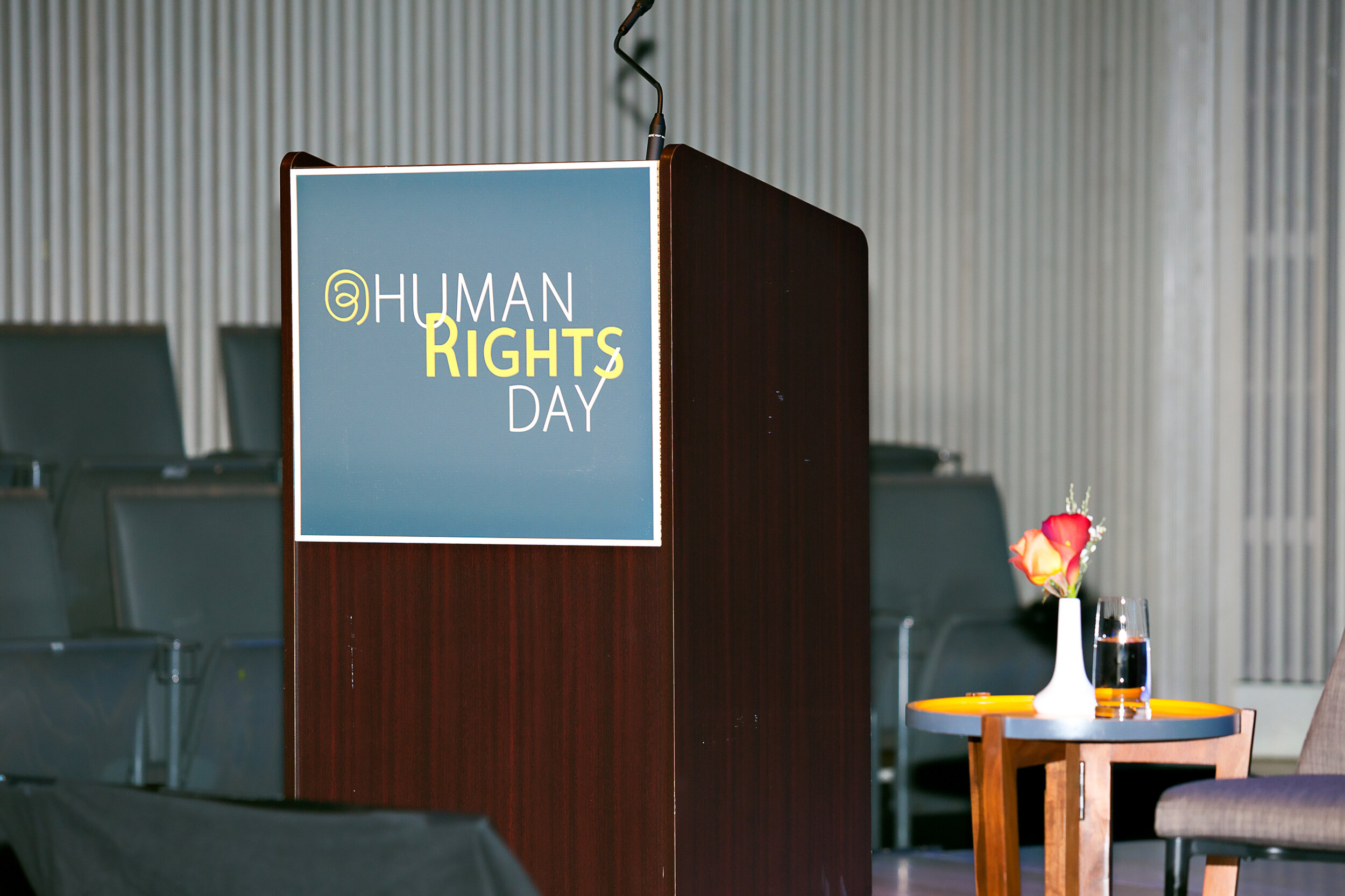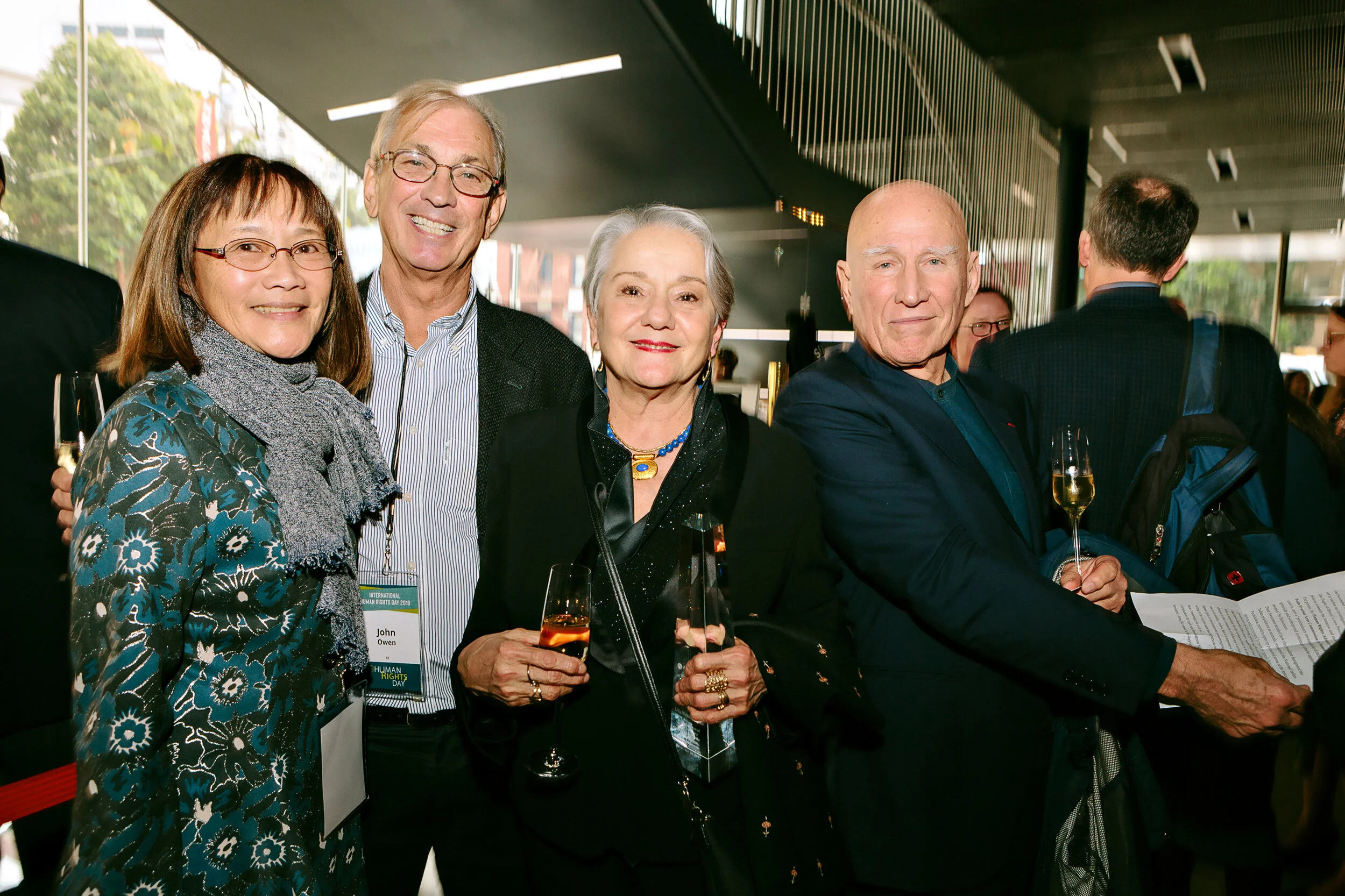
Forced to Flee
People on the Move Yearning to Breathe Free
Human Rights Day 2019 focused on the story of People Forced to Flee and on the Move "Yearning to Breathe Free," and in search of safe haven in another land.
There may be no other issue in today's reality that challenges our collective history, our deepest values, and our essential humanity where a rights-based approach offers understanding, moral imagination and a way forward.
Honoring
Sebastião Salgado & Lélia Wanick Salgado
Sebastião Salgado, transcending the role of economist, journalist, humanitarian, and environmental activist, used photography to frame and capture moral imagination to tell the story of humanity in all its naked pain and beauty, and to give witness to the natural world in all its threatened majesty. His humanitarian and environmental photography has moved hearts and minds like no other, earning him worldwide accolades and global recognition.
“In GENESIS, my camera allowed nature to speak to me. And it was my privilege to listen.”
Lélia Wanick Salgado, artist, musician, and architect found her calling designing, curating, producing, and orchestrating a wide portfolio of photography productions. With courage and resolve, Lélia has been the driving force bringing Sebastião’s stunning work to the world.
Together, Lélia and Sebastião have worked since the 1990’s on the restoration of a small part of the Atlantic Forest in Brazil. In 1998, they succeeded in making this land a nature preserve and created Instituto Terra. Its mission is reforestation, conservation, and environmental education.
Special Guest
Angela Y. Davis is a scholar, activist, writer, and Distinguished Professor Emerita of History of Consciousness and Feminist Studies at UC Santa Cruz. Her work as an educator – both at the university level and in the larger public sphere – has always emphasized the importance of building communities of struggle for economic, racial, and gender justice.
Guest Speakers
Nicole Austin-Hillery is Human Rights Watch’s US Program Executive Director. Ms. Austin-Hillery leads Human Rights Watch’s efforts to end violations in the abusive US immigration system, tackle race discrimination and other rights problems with the domestic criminal justice system, and advocate for national security policies informed by international human rights standards.
Soledad Castillo survived molestation, a life-threatening illness, and child labor before deciding to leave her native Honduras for the US at the age of fourteen. After making the dangerous journey here, she faced neglect and abuse in the foster care system, and had to fight to escape child labor and claim her right to an education. Today, Soledad is a graduate of San Francisco State University, works for an organization that helps homeless youth, and serves on the Voice of Witness education advisory.
Scott P. Campbell is Senior Human Rights and Technology Officer of the United Nations Office of the High Commissioner for Human Rights where he leads their engagement on technology and human rights. He previously served as Africa Section Chief for UN Human Rights in Geneva, and Representative of the United Nations High Commissioner for Human Rights in the Democratic Republic of Congo.
Angie Junck is the director of the Human Rights program at the Heising-Simons Foundation. Prior to joining the Foundation in 2018, Angie was the director of Immigrant Defense Programs and Supervising Attorney at the Immigrant Legal Resource Center (ILRC) for over 13 years. In that role, she led a state and federal policy agenda and programs on crim/imm, immigration enforcement, and immigrant youth.
Emcee: Glen Galaich is the CEO of the Stupski Foundation and is responsible for leading the overall strategy of the Foundation as well as overseeing the programmatic focus areas and operations of the Foundation. Glen previously served as Chief Executive Officer of The Philanthropy Workshop, whose mission was to educate, inspire, and activate a peer network of effective, engaged, and innovative philanthropists.
Becca Heller is the Executive Director and co-founder of the International Refugee Assistance Project (IRAP) IRAP organizes thousands of law students and lawyers all over the world to advocate for the legal rights of refugees and other displaced persons. In the wake of U.S. President Trump's Executive Order banning millions of people from Muslim countries from traveling to the U.S., Becca and IRAP marshaled thousands of lawyers to go to airports nationwide.
Moderator: Randy Newcomb is a Senior Advisor at The Omidyar Group. The Omidyar Group is a diverse collection of global companies, organizations, and initiatives founded by Pierre and Pam Omidyar that strive to catalyze social impact globally. As Senior Advisor Mr. Newcomb explores future trends, new and alternative thinking, and diverse points of view to address the challenges we face in the 21st century.
Kavita Ramdas is a recognized advocate for gender equity and justice. She currently serves as the Director of the Women’s Rights Program at the Open Society Foundations. She served as a Strategy Advisor for MADRE and founded KNR Sisters, an independent consulting venture. At the Global Fund for Women she served as President and CEO it became the largest public foundation for women’s rights in the world.
Regan E. Ralph has directed the Fund for Global Human Rights since its founding in 2002. Previously, she led advocacy, policy, and educational strategies to promote women’s health care at the National Women’s Law Center and ran the Women’s Rights division of Human Rights Watch. Regan is a graduate of Harvard University and Yale Law School, and studied international law at the London School of Economics and Arabic at the American University in Cairo.
Event Images
Resources
Migrations by Sebastião Salgado
In Migrations, Sebastião Salgado turns his attention to the staggering phenomenon of mass migration. Photographs taken over seven years across more than 35 countries document the epic displacement of the world's people at the close of the twentieth century.
Sebastião Salgado: Migrant in a World of Migrants
The New York Times
Before he was known as a photographer, Sebastião Salgado was something even more essential to his identity: an émigré. His left-leaning politics and commitment to social justice had led him to flee Brazil in 1969 to study economics in France. There, he found countless other exiles — the lucky ones — who had managed to escape the murderous grip of Latin America’s Operation Condor.
Sebastião Salgado’s Eternal Images Of Humanity On The Move
British Journal of Photography
Sixteen years ago, Sebastião Salgado published Exodus. The Brazilian photographer spent six years, and visited more than 35 countries, to document the fraught, desperate and forced mass movement of humans around the globe.
People Everywhere Are On The Move
The Harvard Gazette
“I believe that the major civil rights issue of the 21st century is the issue of immigrant rights,” said Davis, distinguished professor emerita at the University of California, Santa Cruz. “Not only in Europe or the United States, but everywhere — from South America to Africa and Australia.”
Solito, Solita: Crossing Borders With Youth Refugees From Central America
They are a mass migration of thousands, yet each one travels alone. Solito, Solita (Alone, Alone) is an urgent collection of oral histories that tells—in their own words—the story of young refugees fleeing countries in Central America and traveling for hundreds of miles to seek safety and protection in the United States.
Climate Migrants Might Reach One Billion By 2050
Inter Press Service
Imagine a world with as many as one billion people facing harsh climate change impacts resulting in devastating droughts and/or floods, extreme weather, destruction of natural resources, in particular lands, soils and water, and the consequence of severe livelihoods conditions, famine and starvation.
I Fled Nazi Germany. I Hope The US Doesn't Turn Its Back On Refugees
The Guardian
When Kristallnacht (the night of broken glass) took place on 9 November 1938 – a night that Jewish homes, businesses, schools and synagogues throughout Germany were attacked and, in many cases, destroyed – my parents, my older sister and I were living in Berlin. After that, we knew we had to leave. But where could we go? The United States had closed its doors to most Jewish refugees.
We Went To A US Border Detention Center For Children. What We Saw Was Awful
Human Rights Watch
A 14-year old told us she was taking care of a 4-year old who had been placed in her cell with no relatives. "I take her to the bathroom, give her my extra food if she is hungry, and tell people to leave her alone if they are bothering her," she said.
One Deadly Week Reveals Where The Immigration Crisis Begins — And Where It Ends
USA Today
One deadly week reveals where the immigration crisis begins — and where it ends In one week, thousands of migrants overwhelm the U.S. border. We reveal their dangerous journeys and the broken immigration system that awaits them.
The Atlantic
In January of last year, Mireya called me to say she was going to Juárez. She had been living undocumented in the United States for 25 years, but now she was applying for permanent residency. The final step in the years-long process could be done only at the U.S. consulate in Ciudad Juárez, Mexico.
“Climate Refugees” And The Role Of International Law
Oxford Research Group
Despite huge numbers of people being forced to leave their homes a result of climate change, the governance of climate refugees represents a gaping hole in international law.
The U.S. Is Mistreating Children In Its Custody. Can International Law Help?
The American Prospect
Murderous violence. Sexual assault. Criminal gangs. Domestic abuse. Failed governments. Police unwilling or unable to offer protection. These are the reasons child after child gave for coming to the United States in search of safety, as we interviewed them in the U.S. Border Patrol facilities in El Paso, Texas, in June.
US Move Puts More Asylum Seekers At Risk
Human Rights Watch
The Trump administration has drastically expanded its “Remain in Mexico” program while undercutting the rights of asylum seekers at the United States southern border, Human Rights Watch said today. Under the Migrant Protection Protocols (MPP) – known as the “Remain in Mexico” program – asylum seekers in the US are returned to cities in Mexico where there is a shortage of shelter and high crime rates while awaiting asylum hearings in US immigration court.
‘I Had No Options’: The Rohingya Man Who Smuggled Himself
The Atlantic
Myanmar has pushed out Rohingya Muslims for decades. One of them chose to flee within his own country.
IRAP Co-Founder Becca Heller On U.S. Refugee Program
Now This News
“Refugees are not victims desperate for our help. They are survivors who are forced to give up everything in search of a new life, often as a result of our own country’s misguided foreign policies,” she said.
America Treats Illegal Immigration Worse Than Most Crimes. Why?
The Washington Post
Who is an American? Traditionally, we look to citizenship to answer that question, but the issue is more complicated than legal labels. Even President Trump seems to recognize this in his periodic openness to negotiating comprehensive immigration reform.
Welcoming Refugees Makes Total Economic Sense
CNN
In 1956, András Gróf decided to start walking. At 20, he had survived Hungarian fascism, Nazi occupation, and the invasion of the Soviet Red Army.
“We Can’t Help You Here” US Returns Of Asylum Seekers To Mexico
Human Rights Watch
The Trump administration has pursued a series of policy initiatives aimed at making it harder for people fleeing their homes to seek asylum in the United States, separating families, limiting the number of people processed daily at ports of entry, prolonging detention, and narrowing the grounds of eligibility for asylum.
The Trump Administration Is Waging A War On People Fleeing Persecution.
ACLU
In the past few months, nearly 50,000 vulnerable asylum-seekers have been placed into a cruel program that forcibly returns them to Mexico before their applications are even processed by U.S. immigration authorities.
Partners

Special Thanks to Our Advisory Committee
Jessie Brunner, Scott Campbell, Jennifer Davis, Natasha Dolby, Will Fitzpatrick, Glen Galaich, Liliana Giffen, Jen Haile, Renee Kaplan, Randy Newcomb, Amanda Padilla, Stephanie Seale, Abdi Soltani, and Eric Stover.

















































































































































